The pandemic elevated online learning and webinars, virtual meetings, and particularly, virtual exchange (VE), which is embraced globally by young people seeking to socialize in real time across continents and simultaneously learn each other’s languages and cultures.
For language learning and practice, virtual exchange brings two students together or whole classrooms that integrate with other classrooms via online interactions. VE, an evidence-based process to improve foreign language proficiency, connects young people from around the world and immerses them in digital spaces to gain practical skills and build friendships. It offers a powerful means to reimagine what global learning looks like, how it can be conducted, and how many people participate.
After reporting successful interventions working with young people in the U.S. and Middle East and North Africa (MENA), Melissa Baralt, associate professor of Applied Psycholinguistics, Department of Modern Languages, at the Steven J. Green School of International & Public Affairs, is the recipient of a second grant award of $450,000 from the J. Christopher Stevens Virtual Exchange Initiative, a U.S. Department of State’s Bureau of Educational and Cultural Affairs program administered by the Aspen Institute.
Baralt’s funded research will continue to use virtual reality (VR) to create an English-Arabic language learning community: “Virtual Tabadul” (meaning exchange in Arabic). The U.S. Foreign Service Institute describes Arabic as a category IV language, as it is an exceptionally difficult for native English speakers to learn and can require over 2,000 hours of study to develop working proficiency.
“Along with my FIU colleagues Stephanie Doscher and Lakhdar Boukerrou, we’re continuing to deliver VE to U.S. and MENA region students studying Arabic and English,” Baralt said. “Our partners, American universities and universities in Algeria and Morocco, created 12 virtual reality spaces for students to complete real-world tasks together. Half of the virtual exchange is in Arabic and half in English, with both language partners benefitting. With more funding, now we can engage 1000 more students and incentivize them to study world languages.” With their initial grant, Baralt and her team conducted research with brain imaging via fNIRS (functional near-infrared spectroscopy). Their research revealed that carrying out task-based interactions in virtual reality led to better language learning outcomes compared to a traditional classroom environment, and in only half the time.
The Stevens Initiative is an international leader in virtual exchange, which brings young people from diverse places together to collaborate and connect through everyday technology. Created in 2015 as a lasting tribute to Ambassador J. Christopher Stevens, the Initiative advocates for broader adoption of virtual exchange; shares research, resources, and promising practices to improve impact; and invests in programs.
Virtual exchange projects occur synchronously and asynchronously with students engaging in sustained communication over weeks or months to build trust and understand each other’s different cultures. Virtual Tabadul is the first task-based, virtual exchange program for Arabic and English language learning, embedded in virtual reality spaces.
Students put their phones into a Google Cardboard, an inexpensive handheld device, and enter the VR space. They converse over Zoom, and work with their partner to perform a task. The students play at this scavenger hunt to discover audiovisual clues embedded in the VR space, such as a Moroccan student’s video in Arabic or an audio clip of a conversation between a U.S. mother and her child speaking Arabic and English. To see and activate the clues, students move their bodies to hover over numbers and objects in the VR space. After students activate and fully experience each clue, a badge appears in the VR dashboard indicating progress.
“My collaboration with students from North Africa helped me gain a greater understanding of their culture and experiences and to share my experiences in English,” said Mariam Orabi, an FIU student studying Arabic and majoring in Public Relations, Advertising, and Applied Communications.” Because of Virtual Tabadul, I changed my perspective as my world opened wider and I learned about Algerian culture and history and found it relatable, even more than I expected. I made friends overseas, my experience improved my Arabic and found that actively learning from a peer differs from being taught in a classroom.”
Amina Serifegue, a student from Larbi Ben M’hidi University in Algeria, said, “I always dreamed of being enrolled in an international education program, and the program came to me, I didn’t have to physically travel to participate. My experience changed my opinion of how languages are learned. It really is about culture and interaction, not just grammar.”
Virtual Tabadul is an interdisciplinary effort created by an FIU team of linguistics and Arabic language teaching specialists (Department of Modern Languages), virtual reality designers at the I-CAVE (College of Communication, Architecture + The Arts), specialists in COIL (FIU Global Learning), and Biomedical Engineering.
Virtual Tabadul is implemented by Florida International University and is supported by the J. Christopher Stevens Virtual Exchange Initiative (JCSVEI). JCSVEI is a U.S. Department of State’s Bureau of Educational and Cultural Affairs program administered by the Aspen Institute.

